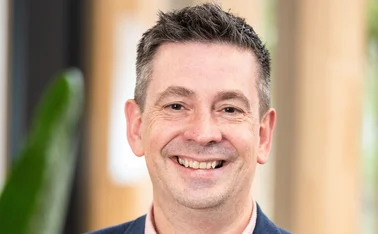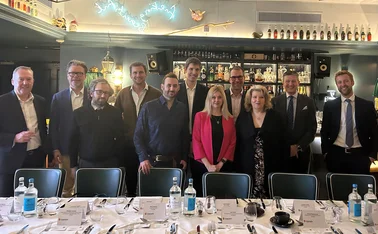
Biba: Conference Speakers

This year’s British Insurance Broker’s Association conference, on 13 to 14 May, will see more than 5500 attendees descend on Manchester. Post caught up with some of the speakers to find out a bit more about them and what they thought this year’s talking points would be.
Jo Causon - Chief executive, Institute of Customer Service
Did you always want to be in the career you’re in now? How did you get to where you are today?
I am enormously proud to lead The Institute of Customer Service. There are not many jobs affording the opportunity to work across so many different industry sectors and allow such diversity in both my day-to-day activities and the work we do over the longer term. For me leading an organisation that has a clearly defined purpose and ambition to achieve is critical – and this is w hat gets me out of bed every day.
What would you say your career highlight has been?
I wouldn’t say there has been a single highlight. I’ve been fortunate enough to have more of an accumulation of connected achievements. The connection is that I have been able to work with great people, all of whom have been focused on delivering an outcome they believe in.
Is there anything you would change about your career to date?
I can honestly say no as I have learnt so much at each stage. For me this means that real wisdom comes from experience, drive, humility and purpose – keep these in balance and you cannot go far wrong!
What is your view of the insurance industry?
The UK insurance industry scores just above the average for all sectors in the latest UK Customer Service Index. While this is good news, it is tempered with the reality that customer satisfaction across the sector has fallen steadily. These latest findings also underline the importance of customer service in influencing business performance. With consumers more likely than ever to recommend on the basis of a good experience, it means we are in a critical time for the sector to make improvements.
What are the topics the market will be talking about at this year’s Biba?
How organisations are meeting customers’ increasing demands for rapid response service at a time convenient to them. This means addressing how complaints are handled, how insurance companies interact with customers across multiple channels and how they engage their staff.
Vincent Franklin - Actor and founder of communications consultancy Quietroom
Did you always want to be in the career you’re in now?
I really enjoy my ‘portfolio career’. When you’re inside an industry it’s too easy to lose touch with what that industry looks like from the outside. So spending time in different sectors – finance, insurance, utilities – and working with lots of different companies means I can always be the customers’ advocate.
How did you get to where you are today?
Sheer bad luck! My dad was a market trader and I studied English at university. So when we started Quietroom, I brought together the two things I knew best – how customers behave and how language can change how we feel. But at that time – the Crimean war was in full swing when we started – businesses and brands were more interested in pictures and colours than words. So it was an uphill struggle to get people to listen to what we had to say. Today, businesses are really beginning to understand how valuable and affordable good words are.
What would you say your career highlight has been?
I’m not the grammar police. I’m only interested in changing words if it will help people make good decisions. So, helping members of the Kodak Pension Plan move to a new scheme rather than enter the Pension Protection Plan is one of my career highlights, even though it wasn’t the most glamorous job. We had to find a way of talking to members who were disengaged and, in many cases, angry. We were told that it wouldn’t work, that we’d never get enough people to even vote – let alone vote in favour. But six months later, 80% of members voted, and 97% voted ‘yes’.
Is there anything you would change about your career to date?
I wish we’d started Quietroom when we were younger. Setting up a business when you’re old and tired and have children who need you at home for an hour or two a week is tough.
What is your view of the insurance industry?
I spend around £2k a year on general insurance. You’d think the companies that take my money would want to show me how much they value my business. But they don’t. My quote for year two will be a lot higher than it was for year one, for exactly the same cover. This means price is no longer an indicator of quality, which cheapens the entire insurance offer – it means I use an aggregator rather than a broker, and it makes me question whether I need cover at all.
Julie Page - CEO, Marsh’s UK commercial and consumer practice and chair, Biba’s International and Wholesale Brokers’ Advisory Board
Did you always want to be in insurance? How did you get to where you are today?
As a child, if asked, I’d say I wanted to be ‘DG of the BBC’; I had no idea what that meant, but I liked the way it rolled off the tongue. I don’t think I knew insurance existed! After leaving school at 16, I gained an apprenticeship with a local insurance broker. I realised there was more to insurance than household policies so I moved to Alexander and Alexander. A&A was subsequently acquired by Aon; a few years later I joined Marsh.
What would you say your career highlight has been?
Just over a decade ago, our industry went through some profound changes that resulted in brokers significantly re-examining their operating models. The three or four years that followed demanded a complex programme of change and I discovered times like these create unparalleled opportunities for those willing and able to get involved. Top of the list though is successfully balancing a career with parenthood.
Is there anything you would change about your career to date?
Over the years I have had the privilege of looking into the workings of so many industries around the world. I have always felt challenged and intellectually satisfied. So, I think the answer generally is no.
What is your view of the insurance industry?
As an industry, we are incredibly material to the UK economy and make a significant contribution to gross domestic product. Far more importantly, we play a key role in providing people with support when the worst happens. There are some fabulous stories about brokers and insurers pulling on their wellies and getting to the places they were most needed when floods hit.
What are the topics the market will be talking about at this year’s Biba?
Regulation – probably with an interesting political dimension. Digital delivery is also a major topic for the market generally, particularly for SMEs. As SMEs increasingly turn to digital channels to buy their insurance, they need to be sure they are getting what they need.
Andy Watson - CEO, Ageas
Did you always want to be in insurance? How did you get to where you are today?
I trained as an actuary so insurance was a natural fit and I quickly realised it had great potential, offering one of the widest ranges of career roles. Building an understanding of the industry helped me shape my career before I joined Ageas in 2010. Being motivated, having high standards, recognising the importance of building a strong team and delivering what customers and shareholders need all brought me to my current role.
What would you say your career highlight has been?
It’s always when we do the right thing for customers. The 2014 floods were a great example. I am so proud of the way both Ageas and most of the industry rose to the challenge of dealing with customers in real distress. It really enhanced the sector’s reputation with the government, the media and most importantly with the public.
Is there anything you would change about your career to date?
In insurance I think nothing, but if we are talking about life choices I often visualised my success as England’s Rugby World Cup Winning Captain!
What do you think the biggest issues facing UK insurers are?
In some respects the challenges remain the same – regulation, reputation and rates, and the speed of technological development and how the industry can tap into it. We already use technology to transact a sizeable proportion of our business but the extent to which technology actually impacts the risks we underwrite [means we all need] to adapt to a new landscape.
What is your view of the insurance industry?
It is a dynamic and diverse industry that offers employment to over 300,000 people and contributes around £25bn to the UK economy, and it can really help customers solve issues in their lives.
What are the topics the market will be talking about at this year’s Biba?
Immediately after the General Election there will be debate about the impact the new government will have. Inevitably there will be talk about the consolidators and what’s next for brokers. Above all I hope that brokers will take the time to tell insurers what’s on their mind.
Only users who have a paid subscription or are part of a corporate subscription are able to print or copy content.
To access these options, along with all other subscription benefits, please contact info@postonline.co.uk or view our subscription options here: http://subscriptions.postonline.co.uk/subscribe
You are currently unable to print this content. Please contact info@postonline.co.uk to find out more.
You are currently unable to copy this content. Please contact info@postonline.co.uk to find out more.
Copyright Infopro Digital Limited. All rights reserved.
You may share this content using our article tools. Printing this content is for the sole use of the Authorised User (named subscriber), as outlined in our terms and conditions - https://www.infopro-insight.com/terms-conditions/insight-subscriptions/
If you would like to purchase additional rights please email info@postonline.co.uk
Copyright Infopro Digital Limited. All rights reserved.
You may share this content using our article tools. Copying this content is for the sole use of the Authorised User (named subscriber), as outlined in our terms and conditions - https://www.infopro-insight.com/terms-conditions/insight-subscriptions/
If you would like to purchase additional rights please email info@postonline.co.uk
Most read
- Esure offers customers six-months free cover for latest tech glitch
- Big Interview: Jason Storah, Aviva
- Copart confirms delays to Luton Airport salvage operation







